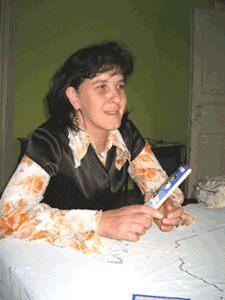Shorena Kakabadze, Kutaisi
Nana Idadze
You will often hear these words in boarding schools and orphanages these days. The moment you cross the threshold of any of these institutions you see the sad eyes of abandoned children and at that very moment you want to find their mothers and persuade them that their children need them.

If you ask these children who the most beautiful person in the world is, they will answer with no hesitation-my mommy. These children love their moms most of all even though, many of them have never seen them. I see a little girl from Zestaponi St. Barbare Boarding School even now. When I asked her what she wanted to be when she grew up she answered without hesitating- to be a mother. One of the institution’s tutors said out loud: I wish some day your mom understands her mistake and comes to visit you for the first time in her life.
It is difficult for these children to live without a mother as well as for their tutors to see these children suffer. They say working in boarding schools and similar institutions is an example of heroism. According to the Ministry of Education and Science (MES) approximately 5,000 children that lack parental care are registered in Georgia. Experts say that these children differ from the kids of their same age group very much; they are severely depressed and often very aggressive.
“A mother brought her child and left in Brotseula boarding school once. The child cried for 2 days and 2 nights without stopping for even a second. On the third day we took the child back to the mother. The fact is that abandoned children are different from other children. They lack love and warmth. When you leave a boarding school they hug your legs and ask to be their mom or to take them home with you. On one hand this situation frustrates you but on the other hand you are filled with energy and try your best to do what you can for their wellbeing. The government launched an interesting program on solving the problem of abandoned children and this encourages us very much,” states Nana Idadze, social servant of the Department for the Prevention of Abandoning Orphans and Children without Parental Care within the Ministry of Education and Science.
The process of deinstitutionalization which means to bring children back home from various foster institutions started in 1999. The European Union conducted a long term research on children’s conditions in Georgia and gave some recommendations to Georgian government. The government made first steps to meet these recommendations which made such words as reintegration (to return children from boarding schools to their biological families), prevention, and deinstitutionalization and so on popular.
“The state tried to reduce the number of beneficiaries at the institutions. There are various sorts of allowances. For example, in the case of child reintegration and prevention the parent receives 90 GEL a month during six months. If the child is disabled, the allowance is 125 GEL. As for fostering, the foster family gets an allowance of 200 GEL a month. However, as soon as the problem is resolved the fostering ends and it creates problems in the foster family,” said Nana Idadze.
Specialists state that fostering is a new experience in our country. There are some issues that hinder fostering process and security is not guarantees either.
“There is a draft law and we have information that the new parliament is supposed to discuss the draft law. According to it, if a parent does not contact with a child during three months, the child can be fostered. The law will be a relief for us because the child from the institution and abandoned by the parent can be sent to a foster family where s/he will grow up in a family environment. During recent years, we have sent several recommendations regarding the amendment that should be introduced into the law. I cannot understand why the law-adoption is prolonged. We categorically demand to implement legislative changes in the field. When the EU recommends the state to reduce the number of children in institutions, there will be no progress unless practical steps are taken,” said Nana Idadze.
The woman, who prefers to stay anonymous, stated that she has been unsuccessfully going to adopt a child for a long time. She explained: “At first sight the process of adoption is not very complicated. However, there are plenty of barriers that disable a person to take some practical steps. They promise that we can adopt a child but if his/her parent appears I might lose the child. Nobody will take such a risk. The state should regulate the process somehow; superficial discussions will not change the situation.”
We appreciate the will of the government to return the children from the institutions to their natural families. The main point is to create real conditions for them, to simplify the process and make it accessible. Social workers claim that applicants for fostering the children are more than children that can be fostered.
It is fact that children grow up better in family environment; they adapt to independent life and they have bigger chance to become independent and contributing members of society. The point is to enable the children to take advantage of the opportunity to live as children and lead happy lives.



